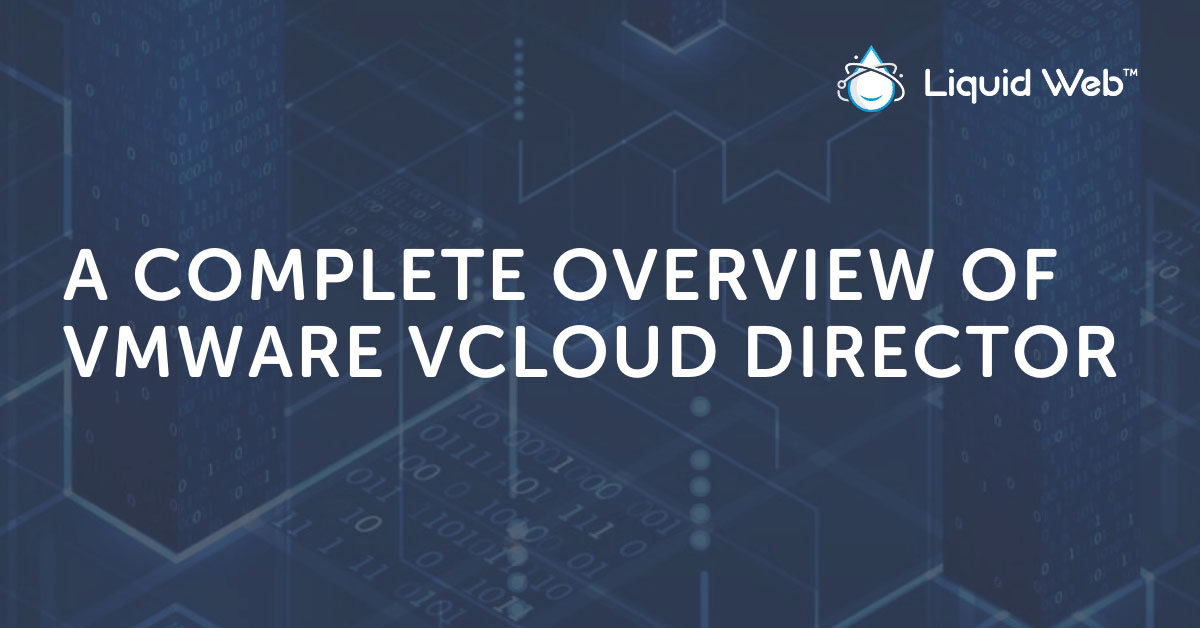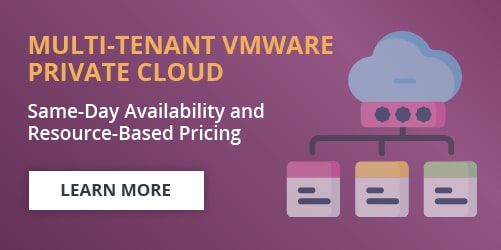
What is VMware vCloud Director?
VMware vCloud Director is a provider of Infrastructure-as-a-Service (IaaS). vCloud Director goes by a few different names such as VMware Cloud Director, VM Cloud Director, and VCD. With it, you can create virtual data centers in software.
Your virtual data centers are made up of multiple ESXi hosts. With these hosts, you can allocate pools of resources and split them up among different customers, departments, and your various virtual data centers.
How Does vCloud Director Work?
VCD allows service providers to simplify, reorganize, and group their virtual machine hosts into multi-tenant virtual data centers. These virtual data centers bring with them easy-to-use, self-service, and automation-friendly control panels. These virtual data centers are split into various organizations, which can be further split up into groups and managed with permissions.
Companies are assigned their own organization/virtual data center where they can provision their vApps (collections of preconfigured VMs that combine operating systems with applications), virtual machines (VMs), and virtual storage. They can set up virtual networks with routers, switches, and firewalls.
Service providers benefit from fewer management tickets, and customers benefit from being able to easily make changes on the fly.
How Does vCloud Director Differ From vSphere?
vSphere accesses your ESXi hosts running directly on the physical hardware. From there, you can make virtual machines or vApps. You can adjust resources to add or remove things like RAM, CPU, or hard disk space. Because vSphere works at a lower level, this is where you’d add things like ESXi hosts, clusters, and virtual switches.
vCloud Director operates on a higher level and is an abstraction of vSphere and the hardware that it controls. VCD allows you to create virtual data centers. vSphere, instead, lets you create virtual machines in traditional data centers.
No longer do customers have to raise tickets to adjust their virtual hardware. They can build new VMs, switches, and networks as needed within their virtual data center.
What are the Top Features of vCloud Director?
1. Elastic and Secure Virtual Data Centers
This allows organizations to create and deploy multiple software-defined data centers (SDDCs) from a single set of physical resources. Storage, compute and network resources can all be allocated to vApps and virtual machines dynamically and managed at the organizational level. These resources are secured by isolated virtual resources and role-based authentication.
2. Multi-Site Management
VMware vCloud Director lets you manage your various data centers from multiple locations through a single user interface. It has reporting and monitoring to ensure services are running smoothly.
3. ISV Ecosystem
Both VMware VCD and VMware vSphere can be expanded in functionality through their extensibility frameworks. You can add your own or use one of many ISV (Independent Software Vendors) built for them These custom solutions span multiple industries. VCD and vSphere span multiple industries including backup, cloud, DRaaS, and security.
4. DRaaS Workload Protection
In an uncertain world where systems fail, recovery is critical to any organization. DDraaS is a powerful addition to vCloud Director that enables disaster recovery and data protection as a service.
5. Cloud Migration
Enable easy lift and shift migrations with the VMware VCD Availability plugin. With this, customers can perform self-service cold or warm migrations with ease. Cold migrations are when a VM is powered off during the migration, while a warm migration is when the VM is active during the migration.
You can clone your infrastructure so you could have a test and production environment. Everything from the VMs, networks, switches, and routers would all be cloned at once. This helps with rapid deployments and migrations.
6. Automation
With vCloud Director, you no longer have to open tickets to create virtual machines or manage your infrastructure or use complicated automation scripts. With the VCD Administrator power user, you can make these changes as needed. vCloud Director enables automation through a point and click interface. Behind the scenes, vCloud Director generates a script and vSphere executes the script. This not only simplifies automation, but it also brings with it new kinds of automation that might not otherwise be possible. The VMware template feature is also very handy allowing you to rapidly deploy virtual machines.
7. Application Platform-as-a-Service
You can service your customer’s needs by creating applications for vCloud Director that extend its capabilities. There are also a bunch of already built applications for vCloud Director available on the VMware Cloud Marketplace. They are certified to be compatible and ready to use.
8. Resellers
VCD can be used for value-added resellers who build their own data centers virtually in software and then sell the various virtual machines to end users. It can also be useful for service providers in allowing customers to self-service their infrastructure.
What are the Business Benefits of Using vCloud Director?
Operational Efficiency
Multi-tenancy infrastructure can be managed, cloned, and automated through an easy-to-use interface. Self-service virtual data centers are secure, isolated, and easy to use. Finally, monitoring of your VDC allows for efficient allocation of resources as they are needed by various vApps and virtual machines.
Monetization
Self-service data centers allow for extreme monetization. Your customers can trigger workflows that automate the building of VMs and network devices in their data center. The reselling potential of data centers and VMs within that data center is phenomenal. Many companies integrate virtualization into their systems by hiring developers to build a management platform.
Scalability and Security
vCloud Director is built for growth. You can clone data centers or configurations and deploy them to multiple customers. Ensure these deployed systems stay safe with Next Generation Firewalls able to protect all layers of the TCP stack. With tools like the NSX Distributed Firewall and other NSX tools, not only can you filter packets, you can inspect the data in the packets and protect against malware and advanced attacks. Also, load balance your workflows and build your VMware clusters out as needed.
VMware vCloud Director Use Cases

Healthcare
HIPAA compliance is very important in the healthcare industry. vCloud Director allows you to segment and isolate your data in a secure manner. Departments can be separated out and protected behind firewalls. You can also set policies and enforce them and control who has access to what. Multi-hospital organizations can take advantage of VCD’s cloning ability to clone entire infrastructures from one hospital or location to another.
Education
As the world moves towards online learning, the need to access your data anywhere on any device and securely is more and more important. Use vCloud Director to fully embrace cloud computing and rapidly grow and change as needed. No longer are you anchored to clunky server rooms running outdated software that are hard to set up and maintain. As your classroom changes, VMware is right there to change with you.
Engineering
Engineers can use vCloud Director to test data or to build and run simulations in a test environment on a test database. From there, you can scale up your test environment and database to production scale and test with real-world load levels. If everything works as intended, you can then deploy with confidence, knowing that everything will work flawlessly.
Financial
vCloud Director helps the financial sector on two fronts. First, VCD helps you secure your money with tools like segmentation, user roles, encryption, isolation, and Next Generation Firewalls.
On another front, vCloud Director helps you with your databases. As you may know, databases are the cornerstone of the financial sector. Not only can you scale your databases and database servers as needed, but you can also keep them all separated and organized on their own virtual servers.
Automotive
Automation got its start in the automotive industry with the assembly line. vCloud Director takes it to the next level. The automotive industry has many parts to it the supply chain, engineering, safety, and marketing segments of the business. All of these segments have rapidly changing needs and demands. vCloud Director can scale and adapt to meet this demand. Furthermore, your can automate and rapidly deploy new projects as new cars are released. Through automating and cloning, you can ensure that things are stable, secure, and adhere to industry standards.
VMware vs Cisco vs Nutanix: Which Do You Choose?
Use the feature comparison below to see how VMware vCloud Director compares against Nutanix Calm and Cisco UCS Director:
| Feature | Cloud Director | Cisco UCS Director | Nutanix Calm |
|---|---|---|---|
| Extensibility | X | ||
| Multi-Tenant | X | ||
| Self-Service | X | X | X |
| Automation | X | X | |
| Templates | X | X | X |
| AWS/Azure Integration | X | X | |
| Cloning/Testing | X | X | |
| Cisco Integration | X | ||
| Backup | X | X | X |
| Machine Learning | X |
vCloud Director vs Cisco UCS Director
Deep integration with Cisco devices definitely gives Cisco UCS an edge over VCD. However, vCloud Director makes up for it with its extensibility. You can add your own Cisco integrations or integrations with other apps and services with VCD. Furthermore, you’ve got vCloud virtual routers, switches, and firewalls, which can be cloned and replicated in a multi-tenant environment. With traditional Cisco hardware, you can’t clone hardware setups. This is something you can only do in a virtual environment with vCloud Director.
vCloud Director vs Nutanix Calm
VCloud’s extensibility is powerful. Not only can you add features and plugins, but you can also customize vCloud Director for your business. Beyond that, you can segment your business units and provide role-based access in a multi-tenant environment. Nutanix Calm’s strength is machine learning. With that, it can enable predictive capacity planning. This helps to better optimize your infrastructure.
Single-Tenant vs Multi-Tenant VMware Private Cloud at Liquid Web
It’s time to choose: Do you stick with the single-tenant vSphere or upgrade to multi-tenancy with vCloud Director?
Dedicated VMware performs better because there are no resources shared and allows you to customize more of your environment. If this sounds good to you, you should check out our VMware Private Cloud.
On the other hand, there is vCloud Director, which is a multi-tenancy platform. It brings with it cost savings with better resource sharing. VCD’s simple interface allows self-service of your infrastructure, and automation makes maintenance a breeze. If this sounds good to you, check out our Multi-Tenant VMware Private Cloud, which is powered by vCloud Director.
[ad_2]
Source link







